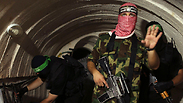
Hamas terror tunnel
צילום: רויטרס
Surveillance cameras to monitor Gaza reconstruction under Hamas
UN official confirmed the set up of cameras 'to help ensure the security of vendor facilities and the their supplies'; a Palestinian source said that the cameras have been installed to ensure Hamas will not rebuild the terror tunnels.
The Palestinian government says that closed circuit cameras will monitor the thousands of tons of cement that will be needed to rebuild homes in the Gaza Strip that were destroyed or damaged during the summer’s fighting between Israel and Hamas in Gaza.
A Palestinian security source told The Media Line that the cameras have been installed and the purpose is to ensure that Hamas will not be able to rebuild the network of tunnels that were built under Gaza including some that were meant to be used to attack Israel.
Israel destroyed about 30 tunnels during the fighting with Hamas, which left more than 2100 Palestinians and 70 Israelis dead. Israel allowed 600 tons of cement to enter Gaza last week during the visit of UN Secretary General Ban Ki-Moon.
The international community recently donate $5.4 billion for Gaza reconstruction. Speaking to the Security Council this week Ban said donors should pay their pledges quickly so that reconstruction can begin before the winter’s rains begin in earnest.
“Nothing could have prepared me for what I witnessed in Gaza. I saw mile after mile of wholesale destruction,” Ban said.
The UN says that more than 100,000 residents of Gaza remain homeless with over 50,000 still living in UN-run school buildings. Many Gazans still do not have clean drinking water, and electricity is often on for just six hours each day.
“The clock is ticking. $414 million is immediately needed for humanitarian relief, $1.2 billion for early recovery needs and $2.4 billion for reconstruction efforts,” Ban said.
UN official James Rawley has confirmed the set up of cameras “to help ensure the security of vendor facilities and the safeguarding of their own supplies,” but says “party affiliation is not part of the mechanism, which is based on humanitarian and reconstruction needs.” He told The Media Line that someone whose home was destroyed will be required to present his Palestinian ID to an approved vendor in Gaza when collecting his/her materials, but did not specify what ‘approved’ meant.
Gaza based journalist Mohammed Faiad says the winter rain has already begun, and people do not want to spend winter without a roof over their heads.
“Many people are without homes. There are no homes to rent. And it takes more than one month to build a home. I don’t know what these people are going to do,” he told The Media Line.
Rawley describes the current situation as “terrible”. “There are tens of thousands of people in Gaza who need to get to access to construction materials ASAP,” Rawley said. The first shipments of materials have crossed into Gaza but we still need a number of weeks to fully set up the mechanism.”
Last week, a trilateral mechanism was announced at the donor conference in Cairo. Israel, the Palestinian Authority and the United Nations agreed to facilitate the movement of necessary building materials into Gaza.
The materials are only allowed through Karem Shalom checkpoint Crossing. It was sent to designated warehouses where it is being held until the reconstruction begins.
“The merchants of those stores will screen family members, taking their name and why they want the supplies and if they pass they can get it,” the Palestinian security source said. “This is to make sure it does not go to Hamas or Islamic Jihad to make tunnels.”
A timetable has not been set but Palestinian observers have said that rebuilding Gaza depends on the donors transferring the money immediately to the PA. It also depends on Israel and its willingness to facilitate the movement of the cement and keep the crossings open.
“Will donor pledges be forthcoming? Will the ceasefire in Gaza hold up? Will further steps be taken to strengthen the (Palestinian) government of national consensus in Gaza?
Will other aspects of the blockade progressively be loosened thereby improving the economy (and purchasing power) in Gaza?” asked Rawley.
Officials from the Palestinian Authority said Israel must not stop materials going into Gaza.
“Israel must commit to calm. Gaza is a part of Palestine and the crossings must be opened,” Palestinian Prime Minister Rami Hamdallah recently told Ramallah reporters in a joint news conference alongside UN Secretary General Ban Ki-moon.
Gaza based political and security analyst Hani Al Basoos says the rebuilding process is going slowly and more supplies are needed. “Each day, Gaza needs 3000 tons of cement to keep the process of rebuilding Gaza stable,” he told The Media Line.
The UN says that beyond the immediate effects of the war, Gaza has a long-standing deficit in energy, housing and water.
“The devastation in Gaza is truly immense and under the best of circumstances will take a number of years to rebuild,” Rawley said.
Meanwhile, the Palestinian security source in Gaza says the trilateral mechanism will not be able to stop Hamas or other similar groups from buying material on the black market, something the UN is aware of.
“This mechanism only monitors the materials entering as part of the formal market. This concern does, however, underpin the need for governance to be fully restored in Gaza, including the rule of law.”










